Mt Parnitha: The Great Refuge
Just 40 minutes from the heart...
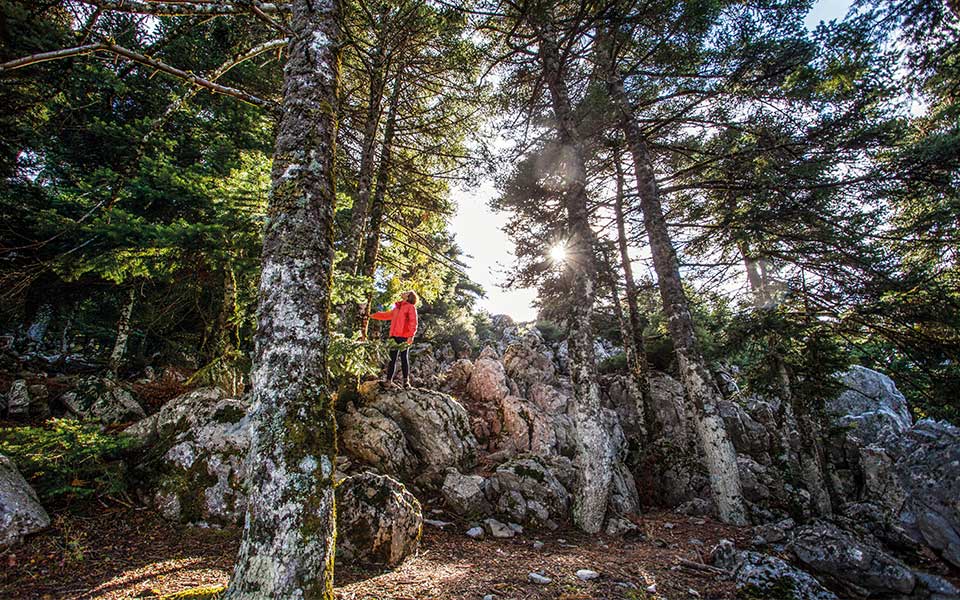
Mount Parnitha, the nearest national park to a capital city in Europe, offers hiking trails and climbing routes.
© Olga Charami
The mating call of the buck could be heard all night. Autumn is mating season for deer, and his cries echoed along the mountainside. As I lay in my bunk at the Bafi Refuge, with the breeze blowing in through the half-open window and carrying the strong scent of the pine forest, I imagined that animal, perhaps crouched by some natural spring, waiting for his doe. I don’t know if this courtship ritual came to anything, but I do know that I felt very far from my daily life in the city of Athens.
That feeling was still with me on the morning of the next day when, as the gentle morning light filtered through the trees and birdsong filled the air, Giannis Helis, who operates the refuge, helped me trace out potential routes on the map. This wasn’t not my first time in Mt Parnitha National Park, but that’s how it always feels when I’m up there – fresh and new.
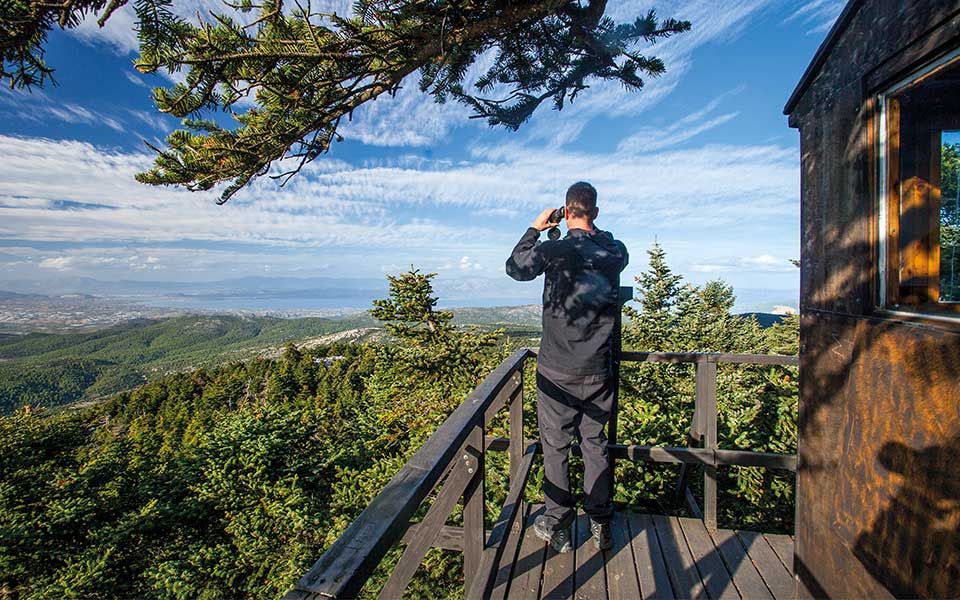
The lookout tower near Skipiza Springs allows park workers and volunteers to keep an eye out for wildfires.
© Olga Charami
As it happens, I’ve been able to admire the mountain’s famed Flabouri Ridge from all the houses I’ve lived in, but that familiarity hasn’t dulled me to its charms. Like most Athenians, I’ve come here time and again to play in the snow, take day-long hiking trips, or just drink rakomelo (raki with honey and spices) at the Bafi Refuge while gazing down at the city below. It was through the Houni Ravine that I set off on my first long hike, and on the crags of Acharnes that I completed my first major rock climbs.
I’m still looking forward to the day that I conquer the long freefall abseil at Ptisi in Pano Flabouri. But this time, when I was to spend a night on the mountain and had to pack my sleeping bag and flashlight into my backpack, the trip to nearby Parnitha – the nearest national park to a capital city in Europe – became a real journey.
Of course, the fact that I came midweek also made a big difference; on the weekends, the mountain is transformed. Cyclists, climbers, joggers, couples, families and groups of young people all spend their time here, using the paths and forest trails, and visiting the rock climbing areas, the natural springs, the lookout stations, and the picnic areas – the most popular of these being Aghia Triada and Mola.
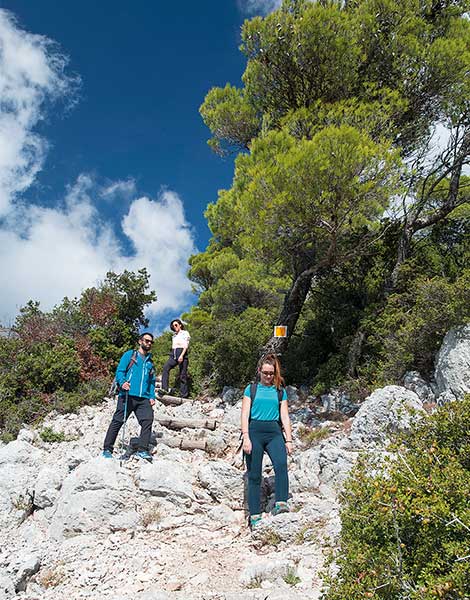
Hiking trails criss-cross the national park.
© Olga Charami
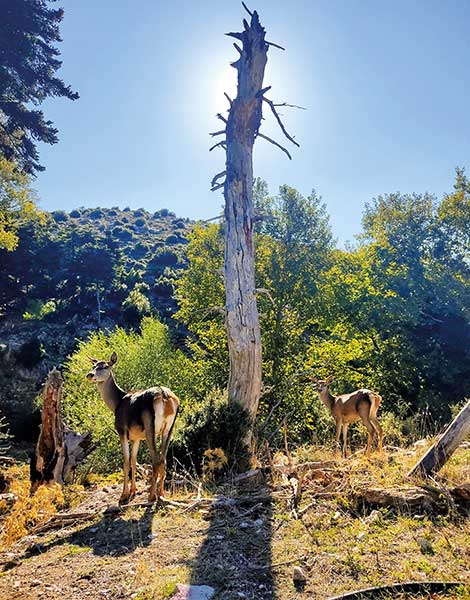
There are herds of deer scattered through the park.
© Olga Charami
There are three ways to reach the mountain by car. You can go from Varybobi to Tatoi, or from Thrakomakedones to the Regency Casino Mont Parnes (you can also use its cable car for free) and the refuges, or from Fili to Dervenochoria. From these spots, an enormous network of footpaths and mountain routes begins; however, after the fires of 2007, barriers have been put in place to prevent cars and other vehicles from penetrating further inside the park. Hikers have access to all sections of the mountain, but proper planning is necessary, or arranging to visit with a guide.
Despite its proximity to Athens, Mt Parnitha constitutes a large mountain wilderness area, with a total expanse of nearly 400 square kilometers and with peaks over 1000 meters high (the highest being Karavola, at 1413 meters). The rich natural landscape, filled with peaks, slopes, valleys, steep crags, ravines, caves and chasms, hides all the dangers of larger mountains, and it’s very easy to lose your bearings out here, too.
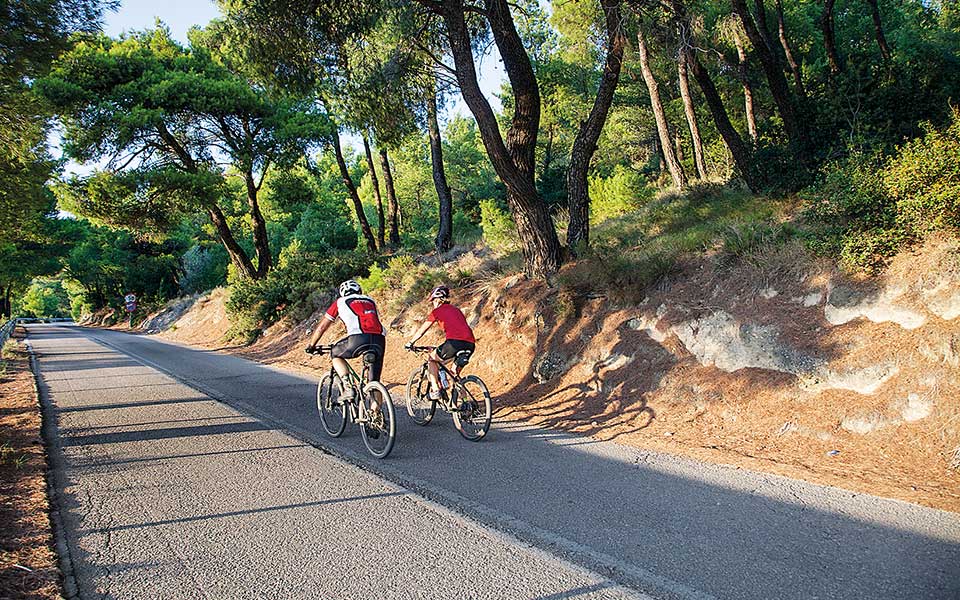
Cyclists and other outdoor enthusiasts take full advantage of what the mountain offers.
© Olga Charami
We were walking on a carpet of fallen leaves. Surrounded by fir and pine trees that shielded the sunlight, we spotted mushrooms, blooming cyclamen, lazy tortoises, and even Cretan wild goats, brought here decades ago and now adapted to the environment. In the silence, we could hear the grunting of a wild boar, rather close by; a little further on, a young deer was surprised by our presence and ran off into the forest.
All of this happened during our 40-minute walk from the Bafi Refuge to Skipiza Springs and the nearby fire lookout tower with its amazing view. The route from Bafi to Mola Spring is a similarly easy hike, as are the routes from the Flabouri Refuge to Mesiano Nero (one hour) and from the casino to the Bafi Refuge (45 minutes).
The more difficult hiking trails, really enjoyable and “mountainous,” include one traversing the Houni Ravine (Thrakomakedones-Bafi Refuge, two hours), one along the Flabouri Ridge (two hours), and a pathway that leads to the Panos Cave through Goura Canyon; this route takes about two hours, though you can hike a section from Arma in half the time. Ideally, you should visit this beautiful cave in the company of specialists who have have the necessary equipment and spelunking experience, and that way you’ll hear all the wonderful stories about the ancient worship of the god Pan, too.
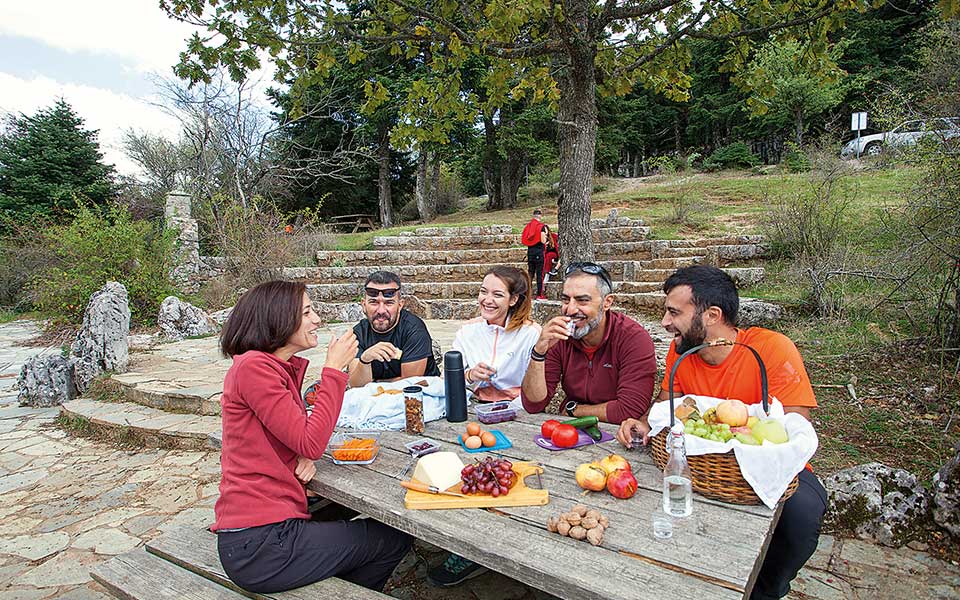
Dining al fresco: families and friends flock to the mountain for picnics.
© Olga Charami
At one point, the sound of children’s voices disturbed the silence as well, albeit briefly. We had returned to the refuge, and two busloads of youngsters together with 15 mountain guides were preparing to explore the forest. The activities for children organized by Trekking Hellas (represented on Mt Parnitha by Giannis Helis) are very popular and can include anything from simple bike rides and walks through the fir forest along with games that teach kids about the environment to the “Adventure Time” program that includes archery, tree-climbing, and crossing a creek on a rope.
There are scavenger hunts and teachable moments. Who’ll be the first to identify a sign that autumn is coming? Who’ll be the first to find a mushroom? Why is it a bad idea to approach the deer? Children seem to retain this last lesson better than many adult visitors. The red deer population of Parnitha has seen an exponential increase over the last few years, due to the absence of predators, although wolves have recently returned to the mountain, helping to bring greater balance to the ecosystem. The largest populations of deer live deep in the forest, but there’s still a good chance of meeting them during hikes. One herd has even gotten used to humans; usually found near the Aghia Triada springs near the road, these animals exhibit almost pet-like behavior!
Nonetheless, it’s still forbidden to go near them, or to feed these wild animals, as the consumption of inappropriate foods often makes them sick – no human food is part of the regular diet of deer. In fact, the vulnerability of these animals is just one more reason for you to be very careful to leave no rubbish behind, even if disposed of properly, as the deer have been known to feed from overflowing rubbish bins.
In any case, the same basic rule of outdoor pursuits applies here as in all natural environments – you leave with absolutely everything that you bring in!

A lazy morning moment for pets and people alike at the Bafi Refuge.
© Olga Charami
Even on weekdays, there are still plenty of people at the Tatoi Royal Estate. In the afternoon, with the sun tilting westwards, you’ll see more bicycles than cars on the twisting roads of Varybobi. The grounds and the royal palace at Tatoi played host to many important people in the 19th and 20th centuries, and bore witness to many historical events, from the deposition of King Constantine I and the deaths of King Alexander and King Paul to the swearing-in ceremonies for the governments of Eleftherios Venizelos, Dimitris Rallis and Georgios Papandreou.
This expanse of almost four thousand hectares is covered by a verdant pine forest, with the 28 protected buildings of the royal summer palace scattered across the grounds. Tatoi thus comprises a historical, architectural and natural monument, the ownership of which only recently passed to the Greek state. The estate has polarized public opinion and its buildings have been repeatedly looted in the past. And although efforts to protect and promote the site began several years ago, only lately have they shown signs of systematic progress.
Around the grounds, the estate’s past grandeur is visible everywhere. The fallen autumn leaves and afternoon light heighten the sense of romantic decline, but the lively voices of visitors show that Tatoi remains very much part of Athens’ present. In the shaded forest, some people jog while others walk their dogs or enjoy their coffees in the idyllic natural setting.
For those who prefer organized hikes and tours, the Friends of Tatoi Association (Tel. (+30) 697 594 7248) is on hand.
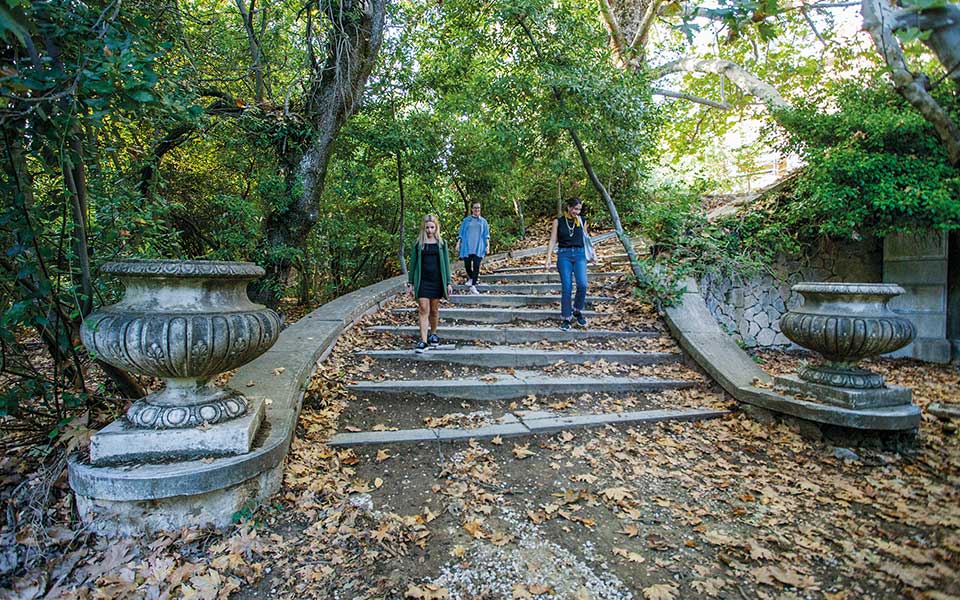
Near the summer palace in the Tatoi Royal Estate.
© Olga Charami
Tatoi is not, however, the only monument in the shadow of the mountain. A number of ancient cities prospered around Parnitha, the ruins of which can be found scattered through the modern suburbs. There were also several castles as, in antiquity, the mountain was a natural defensive barrier around Athens. The fortress at Fyli, for instance, is relatively easy to access. Don’t worry about the barrier preventing car access: it’s only a five to ten-minute walk from the barrier to the remains of the fortress, built in the 4th century BC to control the important route to Boeotia. Although there’s not that much left of the structure, the site it occupies is a wonderful spot with stunning views of the mountain and the city.
In fact, all excursions to Parnitha feature this interchange of imagery: you can admire the views of the city basin as it stretches out to the sea, or you can turn and enter dense forests and be impressed by the craggy rock outcrops, the wild animals, and the rich vegetation instead. Dusk finds most visitors at one of the two refuges, either the Bafi Refuge (mpafi.gr) or the Flabouri Refuge (flabouri.gr, open only on weekends), both of which serve food, offer hospitality and organize various activities. On my overnight, I stayed in one of the renovated 4-12 person lodgings at the Bafi Refuge.
Just knowing that you’re outside the chaotic city brings a sense of peace. Sitting out in the quiet of nature on the refuge’s well-tended veranda, sipping on tsipouro and bathed in the scents of the forest while warm in your coat and hat, you can gaze at the city glittering below – both reassuringly close, and wonderfully distant.
Just 40 minutes from the heart...
Only a short drive from Athens,...